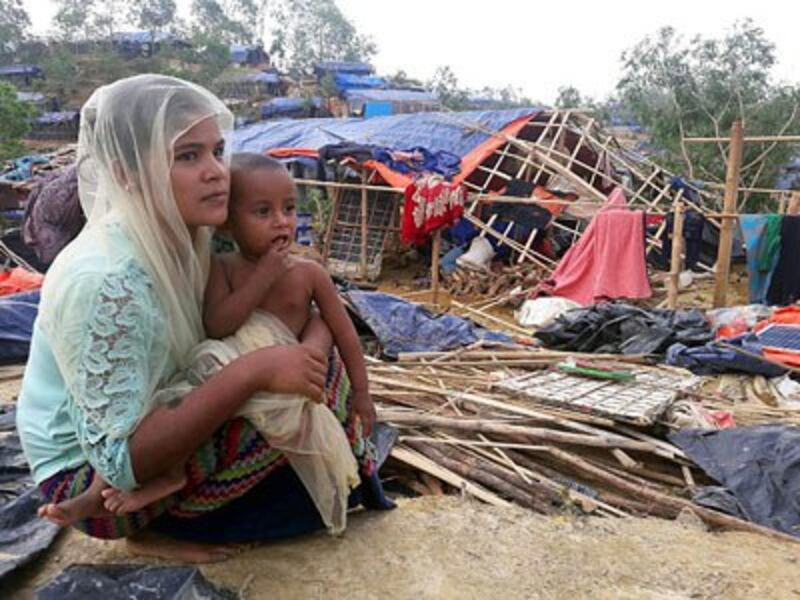One person has been reported dead and about 1,000 buildings have been destroyed by Cyclone Mora which hit Myanmar’s west coast on Tuesday, said an official from the country’s social welfare ministry.
The storm, which made landfall at 8 a.m. local time, unleashed torrential winds and rains on Rakhine and Chin states and in the Ayeyarwaddy region.
It also battered refugee camps in Cox’s Bazar in neighboring Bangladesh that house Muslim Rohingya from western Myanmar who fled a violent crackdown there last October.
Worst hit was western Myanmar’s Rakhine state where the cyclone destroyed houses, religious buildings, government offices, schools, and reservoirs in the state capital Sittwe.
Mora also hammered the townships of Pauktaw, Rathedaung, Taungup, Mrauk U, Minbya, Kyauktaw, Kyaukpyu, Ramree, Ponnagyun, Maungdaw and Thandwe, said Phyu Lei Lei Tun, director of the Ministry of Social Welfare, Relief and Resettlement.
“The worse destroyed state is Rakhine with 163 houses totally destroyed and 746 houses partially destroyed,” she said.
In Ayeyarwaddy region, a resident of Kyutawlay village in Myanaung township died when he was struck by lightning, and 22 homes in Myanaung, Mawlamyinegyun, Pyapon, and Ngapudaw townships were destroyed, she said.
The ministry and regional governments are working on rescuing and resettling those affected by the cyclone Phyu Lei Lei Tun.
'We have lost everything'
Cyclone Mora also leveled more than 1,000 rows of tents for Muslims living in internally displaced persons (IDP) camps in Bawduba, Thatkepyin, Ohndawgyi, Kaungdokeka, Saythamar Gyi, Ohntaw Che and Dapaing, and completely destroyed all buildings in Kaungdokka camp, officials and refugees from the camps said.
Some of the tens of thousands of Muslims who live in the camps are living among the remnants of their destroyed tents, while others are staying at relatives’ homes, they said.
The inhabitants, who are predominantly Rohingya Muslims, have been living in the camps since 2012 when they were displaced by communal violence with ethnic Rakhine Buddhists.
Many in Myanmar consider the stateless Rohingya illegal immigrants from Bangladesh and have denied them citizenship and access to basic services like education, jobs, and health care.
“We haven’t had anything from anyone yet, said Zahida Becon, a Muslim who lives in Kaungdokka camp. “We have started [the Muslim holy month] Ramadan now. We are facing difficulties during this important time, and it is like we are dying.”
Ma Sanda, another refugee in Dapaing said: “We have lost everything, and we want authorities to help us as soon as possible.”
IDP camp officials said they warned inhabitants about Cyclone Mora in advance, but only a few people left to avoid the storm. It was not clear if many residents had a place to flee to.
Nyi Pu, Rakhine state’s chief minister, reportedly visited the Dapaing camp after the cyclone.
But a camp official who gave his name as Adusalam said no local government administrators have visited the site.
“It has been two days,” he said. “No administrator from township or state has visited us. [Someone from] the state government visited, but they only met with camp officials, not with refugees.”
Myanmar’s previous military junta-led government came under heavy fire for its initial reluctance to accept large-scale international aid after Cyclone Nargis hit the country in May 2008, devastating a large swathe of the country.
The catastrophic cyclone was the worst natural disaster in Myanmar’s recorded history with a death toll of at least 138,000 and more than U.S. $10 billion in damage.

Camps in Bangladesh affected
Cyclone Mora hit the coast of Bangladesh on Tuesday, killing at least seven people and injuring 50 others in Cox’s Bazar in the southeastern part of the country bordering Myanmar, according to news wire reports.
The cyclone also destroyed about 20,000 homes and forced 600,000 residents to flee, the reports said.
It ripped apart the tents and shacks of tens of thousands of Rohingya refugees from western Myanmar who have been living in camps in Cox’s Bazar since last October when a security sweep by national forces drove thousands of them from their homes in the wake of deadly raids on local border guard stations.
The storm also damaged clinics operated by aid agencies for the Rohingya and members of the local community, wire reports said.
About 70 percent of makeshift shacks in the Balukhali refugee camp were damaged by the storm, which brought winds of more than 115 kilometers per hour (72 miles per hour), according to a Reuters report.
Though the International Organization for Migration and the United Nations refugee agency (UNHCR) have provided relief to the refugees, Bangladeshi authorities have let them fend for themselves, the report said.
Reported by Thiri Min Zin, Min Thein Aung, and Thant Sin Oo for RFA’s Myanmar Service. Translated by Khet Mar. Written in English by Roseanne Gerin.
